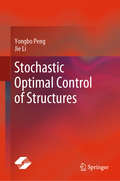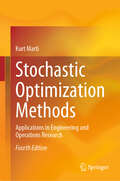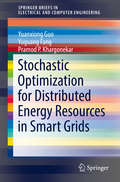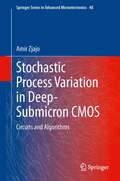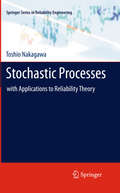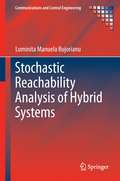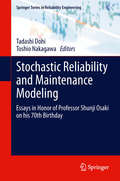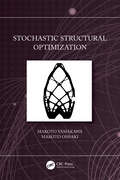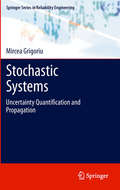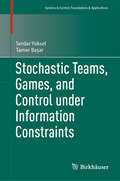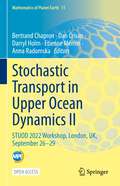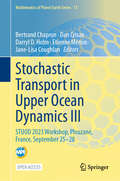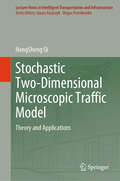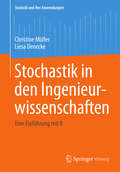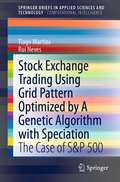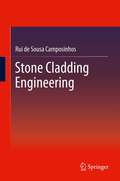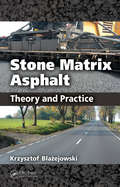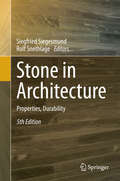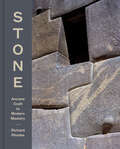- Table View
- List View
Stochastic Networks
by Frank Kelly Elena YudovinaIn the past decade the proliferation of local and global communication networks for computer and human communication, the development of parallel computers with large numbers of processors, and the design of flexible and robust manufacturing systems have spurred major advances in our understanding of queuing volume reviews recent progress. While research on queuing networks uses many of the traditional queuing theory insights, it is more concerned with how network components interact than with detailed models of how an individual queue behaves. In the last few years there have been some surprises, in particular with regard to the conditions for stability of multiclass queuing networks, which is covered in this book. It also covers the challenges reflected Brownian motion has set both as a mathematical object and as a modelling paradigm; the usefulness of ideas from the interacting particle system world; the application of large deviation theory; and the developing connections with optimization and dynamical systems theory.
Stochastic Optimal Control of Structures
by Jie Li Yongbo PengThis book proposes, for the first time, a basic formulation for structural control that takes into account the stochastic dynamics induced by engineering excitations in the nature of non-stationary and non-Gaussian processes. Further, it establishes the theory of and methods for stochastic optimal control of randomly-excited engineering structures in the context of probability density evolution methods, such as physically-based stochastic optimal (PSO) control. By logically integrating randomness into control gain, the book helps readers design elegant control systems, mitigate risks in civil engineering structures, and avoid the dilemmas posed by the methods predominantly applied in current practice, such as deterministic control and classical linear quadratic Gaussian (LQG) control associated with nominal white noises.
Stochastic Optimization Methods: Applications in Engineering and Operations Research
by Kurt MartiThis book examines optimization problems that in practice involve random model parameters. It outlines the computation of robust optimal solutions, i.e., optimal solutions that are insensitive to random parameter variations, where appropriate deterministic substitute problems are needed. Based on the probability distribution of the random data and using decision theoretical concepts, optimization problems under stochastic uncertainty are converted into corresponding deterministic problems.Due to the probabilities and expectations involved, the book also shows how to apply approximative solution techniques. Several deterministic and stochastic approximation methods are provided: Taylor expansion methods, regression and response surface methods (RSM), probability inequalities, multiple linearization of survival/failure domains, discretization methods, convex approximation/deterministic descent directions/efficient points, stochastic approximation and gradient procedures, and differentiation formulas for probabilities and expectations.The fourth edition of this classic text has been carefully and thoroughly revised. It includes new chapters on the solution of stochastic linear programs by discretization of the underlying probability distribution, and on solving deterministic optimization problems by means of controlled random search methods and multiple random search procedures. It also presents a new application of stochastic optimization methods to machine learning problems with different loss functions. For the computation of optimal feedback controls under stochastic uncertainty, besides the open-loop feedback procedures, a new method based on Taylor expansions with respect to the gain parameters is presented. The book is intended for researchers and graduate students who are interested in stochastics, stochastic optimization, and control. It will also benefit professionals and practitioners whose work involves technical, economicand/or operations research problems under stochastic uncertainty.
Stochastic Optimization for Distributed Energy Resources in Smart Grids
by Yuguang Fang Yuanxiong Guo Pramod P. KhargonekarThis brief focuses on stochastic energy optimization for distributed energy resources in smart grids. Along with a review of drivers and recent developments towards distributed energy resources, this brief presents research challenges of integrating millions of distributed energy resources into the grid. The brief then proposes a novel three-level hierarchical architecture for effectively integrating distributed energy resources into smart grids. Under the proposed hierarchical architecture, distributed energy resource management algorithms at the three levels (i. e. , smart home, smart neighborhood, and smart microgrid) are developed in this brief based on stochastic optimization that can handle the involved uncertainties in the system.
Stochastic Process Variation in Deep-Submicron CMOS
by Amir ZjajoOne of the most notable features of nanometer scale CMOS technology is the increasing magnitude of variability of the key device parameters affecting performance of integrated circuits. The growth of variability can be attributed to multiple factors, including the difficulty of manufacturing control, the emergence of new systematic variation-generating mechanisms, and most importantly, the increase in atomic-scale randomness, where device operation must be described as a stochastic process. In addition to wide-sense stationary stochastic device variability and temperature variation, existence of non-stationary stochastic electrical noise associated with fundamental processes in integrated-circuit devices represents an elementary limit on the performance of electronic circuits. In an attempt to address these issues, Stochastic Process Variation in Deep-Submicron CMOS: Circuits and Algorithms offers unique combination of mathematical treatment of random process variation, electrical noise and temperature and necessary circuit realizations for on-chip monitoring and performance calibration. The associated problems are addressed at various abstraction levels, i. e. circuit level, architecture level and system level. It therefore provides a broad view on the various solutions that have to be used and their possible combination in very effective complementary techniques for both analog/mixed-signal and digital circuits. The feasibility of the described algorithms and built-in circuitry has been verified by measurements from the silicon prototypes fabricated in standard 90 nm and 65 nm CMOS technology.
Stochastic Processes
by Toshio NakagawaReliability theory is of fundamental importance for engineers and managers involved in the manufacture of high-quality products and the design of reliable systems. In order to make sense of the theory, however, and to apply it to real systems, an understanding of the basic stochastic processes is indispensable. As well as providing readers with useful reliability studies and applications, Stochastic Processes also gives a basic treatment of such stochastic processes as: the Poisson process,the renewal process,the Markov chain,the Markov process, andthe Markov renewal process.Many examples are cited from reliability models to show the reader how to apply stochastic processes. Furthermore, Stochastic Processes gives a simple introduction to other stochastic processes such as the cumulative process, the Wiener process, the Brownian motion and reliability applications. Stochastic Processes is suitable for use as a reliability textbook by advanced undergraduate and graduate students. It is also of interest to researchers, engineers and managers who study or practise reliability and maintenance.
Stochastic Reachability Analysis of Hybrid Systems
by Luminita Manuela BujorianuStochastic reachability analysis (SRA) is a method of analyzing the behavior of control systems which mix discrete and continuous dynamics. For probabilistic discrete systems it has been shown to be a practical verification method but for stochastic hybrid systems it can be rather more. As a verification technique SRA can assess the safety and performance of, for example, autonomous systems, robot and aircraft path planning and multi-agent coordination but it can also be used for the adaptive control of such systems. Stochastic Reachability Analysis of Hybrid Systems is a self-contained and accessible introduction to this novel topic in the analysis and development of stochastic hybrid systems. Beginning with the relevant aspects of Markov models and introducing stochastic hybrid systems, the book then moves on to coverage of reachability analysis for stochastic hybrid systems. Following this build up, the core of the text first formally defines the concept of reachability in the stochastic framework and then treats issues representing the different faces of SRA: * stochastic reachability based on Markov process theory; * martingale methods; * stochastic reachability as an optimal stopping problem; and * dynamic programming. The book is rounded off by an appendix providing mathematical underpinning on subjects such as ordinary differential equations, probabilistic measure theory and stochastic modeling, which will help the non-expert-mathematician to appreciate the text. Stochastic Reachability Analysis of Hybrid Systems characterizes a highly interdisciplinary area of research and is consequently of significant interest to academic researchers and graduate students from a variety of backgrounds in control engineering, applied mathematics and computer science. The Communications and Control Engineering series reports major technological advances which have potential for great impact in the fields of communication and control. It reflects research in industrial and academic institutions around the world so that the readership can exploit new possibilities as they become available.
Stochastic Reliability and Maintenance Modeling
by Toshio Nakagawa Tadashi DohiIn honor of the work of Professor Shunji Osaki, Stochastic Reliability and Maintenance Modeling provides a comprehensive study of the legacy of and ongoing research in stochastic reliability and maintenance modeling. Including associated application areas such as dependable computing, performance evaluation, software engineering, communication engineering, distinguished researchers review and build on the contributions over the last four decades by Professor Shunji Osaki. Fundamental yet significant research results are presented and discussed clearly alongside new ideas and topics on stochastic reliability and maintenance modeling to inspire future research. Across 15 chapters readers gain the knowledge and understanding to apply reliability and maintenance theory to computer and communication systems. Stochastic Reliability and Maintenance Modeling is ideal for graduate students and researchers in reliability engineering, and workers, managers and engineers engaged in computer, maintenance and management works.
Stochastic Structural Optimization
by Makoto Ohsaki Makoto YamakawaStochastic Structural Optimization presents a comprehensive picture of robust design optimization of structures, focused on nonparametric stochastic-based methodologies. Good practical structural design accounts for uncertainty, for which reliability-based design offers a standard approach, usually incorporating assumptions on probability functions which are often unknown. By comparison, a worst-case approach with bounded support used as a robust design offers simplicity and a lower level of sensitivity. Linking structural optimization with these two approaches by a unified framework of non-parametric stochastic methodologies provides a rigorous theoretical background and high level of practicality. This text shows how to use this theoretical framework in civil and mechanical engineering practice to design a safe structure which accounts for uncertainty. Connects theory with practice in the robust design optimization of structures Advanced enough to support sound practical designs This book provides comprehensive coverage for engineers and graduate students in civil and mechanical engineering.Makoto Yamakawa is a Professor at Tokyo University of Science, and a member of the Advisory Board of the 2020 Asian Congress of Structural and Multidisciplinary Optimization. Makoto Ohsaki is a Professor at Kyoto University, Japan, treasurer of the International Association for Shell & Spatial Structures and former President of the Asian Society for Structural and Multidisciplinary Optimization.
Stochastic Systems
by Mircea GrigoriuUncertainty is an inherent feature of both properties of physical systems and the inputs to these systems that needs to be quantified for cost effective and reliable designs. The states of these systems satisfy equations with random entries, referred to as stochastic equations, so that they are random functions of time and/or space. The solution of stochastic equations poses notable technical difficulties that are frequently circumvented by heuristic assumptions at the expense of accuracy and rigor. The main objective of Stochastic Systems is to promoting the development of accurate and efficient methods for solving stochastic equations and to foster interactions between engineers, scientists, and mathematicians. To achieve these objectives Stochastic Systems presents: A clear and brief review of essential concepts on probability theory, random functions, stochastic calculus, Monte Carlo simulation, and functional analysis Probabilistic models for random variables and functions needed to formulate stochastic equations describing realistic problems in engineering and applied sciences Practical methods for quantifying the uncertain parameters in the definition of stochastic equations, solving approximately these equations, and assessing the accuracy of approximate solutions Stochastic Systems provides key information for researchers, graduate students, and engineers who are interested in the formulation and solution of stochastic problems encountered in a broad range of disciplines. Numerous examples are used to clarify and illustrate theoretical concepts and methods for solving stochastic equations. The extensive bibliography and index at the end of the book constitute an ideal resource for both theoreticians and practitioners.
Stochastic Teams, Games, and Control under Information Constraints (Systems & Control: Foundations & Applications)
by Tamer Başar Serdar YükselThis monograph presents a mathematically rigorous and accessible treatment of the interaction between information, decision, control, and probability in single-agent and multi-agent systems. The book provides a comprehensive and unified theory of information structures for stochastic control, stochastic teams, stochastic games, and networked control systems.Part I of the text is concerned with a general mathematical theory of information structures for stochastic teams, leading to systematic characterizations and classifications, geometric and topological properties, implications on existence, approximations and relaxations, their comparison, and regularity of optimal solutions in information. Information structures in stochastic games are then considered in Part II, and the dependence of equilibrium solutions and behavior on information is demonstrated. Part III studies information design through information theory in networked control systems – both linear and nonlinear – and discusses optimality and stability criteria. Finally, Part IV introduces information and signaling games under several solution concepts, with applications to prior mismatch, cost mismatch and privacy, reputation games and jamming. This text will be a valuable resource for researchers and graduate students interested in control theory, information theory, statistics, game theory, and applied mathematics. Readers should be familiar with the basics of linear systems theory, stochastic processes, and Markov chains.
Stochastic Tools in Mathematics and Science
by Alexandre J. Chorin Ole H Hald"Stochastic Tools in Mathematics and Science" covers basic stochastic tools used in physics, chemistry, engineering and the life sciences. The topics covered include conditional expectations, stochastic processes, Brownian motion and its relation to partial differential equations, Langevin equations, the Liouville and Fokker-Planck equations, as well as Markov chain Monte Carlo algorithms, renormalization, basic statistical mechanics, and generalized Langevin equations and the Mori-Zwanzig formalism. The applications include sampling algorithms, data assimilation, prediction from partial data, spectral analysis, and turbulence. The book is based on lecture notes from a class that has attracted graduate and advanced undergraduate students from mathematics and from many other science departments at the University of California, Berkeley. Each chapter is followed by exercises. The book will be useful for scientists and engineers working in a wide range of fields and applications. For this new edition the material has been thoroughly reorganized and updated, and new sections on scaling, sampling, filtering and data assimilation, based on recent research, have been added. There are additional figures and exercises. Review of earlier edition: "This is an excellent concise textbook which can be used for self-study by graduate and advanced undergraduate students and as a recommended textbook for an introductory course on probabilistic tools in science." Mathematical Reviews, 2006
Stochastic Transport in Upper Ocean Dynamics II: STUOD 2022 Workshop, London, UK, September 26–29 (Mathematics of Planet Earth #11)
by Dan Crisan Darryl Holm Bertrand Chapron Etienne Mémin Anna RadomskaThis open access proceedings volume brings selected, peer-reviewed contributions presented at the Third Stochastic Transport in Upper Ocean Dynamics (STUOD) 2022 Workshop, held virtually and in person at the Imperial College London, UK, September 26–29, 2022. The STUOD project is supported by an ERC Synergy Grant, and led by Imperial College London, the National Institute for Research in Computer Science and Automatic Control (INRIA) and the French Research Institute for Exploitation of the Sea (IFREMER). The project aims to deliver new capabilities for assessing variability and uncertainty in upper ocean dynamics. It will provide decision makers a means of quantifying the effects of local patterns of sea level rise, heat uptake, carbon storage and change of oxygen content and pH in the ocean. Its multimodal monitoring will enhance the scientific understanding of marine debris transport, tracking of oil spills and accumulation of plastic in the sea.All topics of these proceedings are essential to the scientific foundations of oceanography which has a vital role in climate science. Studies convened in this volume focus on a range of fundamental areas, including:Observations at a high resolution of upper ocean properties such as temperature, salinity, topography, wind, waves and velocity;Large scale numerical simulations;Data-based stochastic equations for upper ocean dynamics that quantify simulation error;Stochastic data assimilation to reduce uncertainty.These fundamental subjects in modern science and technology are urgently required in order to meet the challenges of climate change faced today by human society. This proceedings volume represents a lasting legacy of crucial scientific expertise to help meet this ongoing challenge, for the benefit of academics and professionals in pure and applied mathematics, computational science, data analysis, data assimilation and oceanography.
Stochastic Transport in Upper Ocean Dynamics III: STUOD 2023 Workshop, Plouzané, France, September 25–28 (Mathematics of Planet Earth #13)
by Dan Crisan Darryl D. Holm Bertrand Chapron Etienne Mémin Jane-Lisa CoughlanThis open-access proceedings volume brings selected, peer-reviewed contributions presented at the Fourth Stochastic Transport in Upper Ocean Dynamics (STUOD) 2023 Workshop, held at IFREMER in Plouzané, France, September 25–28, 2023. The STUOD project is supported by an ERC Synergy Grant, and led by Imperial College London, the National Institute for Research in Computer Science and Automatic Control (INRIA), and the French Research Institute for Exploitation of the Sea (IFREMER). The project aims to deliver new capabilities for assessing variability and uncertainty in upper ocean dynamics. It will provide decision makers a means of quantifying the effects of local patterns of sea level rise, heat uptake, carbon storage, and change of oxygen content and pH in the ocean. Its multimodal monitoring will enhance the scientific understanding of marine debris transport, tracking of oil spills, and accumulation of plastic in the sea. All topics of these proceedings are essential to the scientific foundations of oceanography which has a vital role in climate science. Studies convened in this volume focus on a range of fundamental areas, including: Observations at a high resolution of upper ocean properties such as temperature, salinity, topography, wind, waves and velocity; Large-scale numerical simulations; Data-based stochastic equations for upper ocean dynamics that quantify simulation error; Stochastic data assimilation to reduce uncertainty. These fundamental subjects in modern science and technology are urgently required in order to meet the challenges of climate change faced today by human society. This proceedings volume represents a lasting legacy of crucial scientific expertise to help meet this ongoing challenge, for the benefit of academics and professionals in pure and applied mathematics, computational science, data analysis, data assimilation, and oceanography.
Stochastic Two-Dimensional Microscopic Traffic Model: Theory and Applications (Lecture Notes in Intelligent Transportation and Infrastructure)
by HongSheng QiMicroscopic traffic model serves as the foundation of traffic flow theory and is the basis for applications such as traffic simulation, autonomous vehicle simulation, and digital twin technology. Conventional traffic models have primarily focused on the longitudinal dimension and have been deterministic in nature. However, vehicles' movements involve both longitudinal and lateral dimensions, and their dynamics are inherently stochastic. Therefore, a two-dimensional treatment is essential.This book explores the theory and application of stochastic two-dimensional microscopic traffic models, including the development of theory, establishment of methods, and applications to autonomous vehicles. The book is organized into three sections: data, theory, and application. In the data section, various open-source trajectory data are analyzed and noise reduction techniques are discussed. In the theory section, various two-dimensional traffic models are developed. In the application section, the potential applications of these models are discussed, including behavioral inferences and lateral wandering. This book will be a useful reference for students, researchers and engineers in the fields of vehicle engineering and traffic technology.
Stochastik in den Ingenieurwissenschaften: Eine Einführung mit R
by Christine Müller Liesa DeneckeDas Buch bietet eine ausführliche Einführung in die Wahrscheinlichkeitsrechnung und Statistik für Ingenieur- und Naturwissenschaftler. Es behandelt die wesentlichen grundlegenden Methoden, die insbesondere im ingenieurwissenschaftlichen Bereich ihre Anwendung finden. Anhand von Beispielen und realen Datensätzen werden die Anwendungen der Methoden verdeutlicht und mit der freien Statistik Software R auch die Gelegenheit gegeben, alle Beispiele direkt nachzuvollziehen und die erlernten Methoden auf andere Datensätze anzuwenden. Dazu wird ebenfalls eine kurze Einführung in R gegeben. Am Ende jedes Abschnitts finden sich Übungsaufgaben mit deren Hilfe die Verfahren geübt werden können. Lösungen zu den Aufgaben werden elektronisch bereitgestellt.
Stock Exchange Trading Using Grid Pattern Optimized by A Genetic Algorithm with Speciation: The Case of S&P 500 (SpringerBriefs in Applied Sciences and Technology)
by Rui Neves Tiago MartinsThis book presents a genetic algorithm that optimizes a grid template pattern detector to find the best point to trade in the SP 500. The pattern detector is based on a template using a grid of weights with a fixed size. The template takes in consideration not only the closing price but also the open, high, and low values of the price during the period under testing in contrast to the traditional methods of analysing only the closing price. Each cell of the grid encompasses a score, and these are optimized by an evolutionary genetic algorithm that takes genetic diversity into consideration through a speciation routine, giving time for each individual of the population to be optimized within its own niche. With this method, the system is able to present better results and improves the results compared with other template approaches. The tests considered real data from the stock market and against state-of-the-art solutions, namely the ones using a grid of weights which does not have a fixed size and non-speciated approaches. During the testing period, the presented solution had a return of 21.3% compared to 10.9% of the existing approaches. The use of speciation was able to increase the returns of some results as genetic diversity was taken into consideration.
Stoff- und Formleichtbau: Leichter Einstieg mit eindimensionalen Strukturen
by Andreas ÖchsnerDieses Lehrbuch stellt die unterschiedlichen Leichtbaukonzepte anhand einfacher eindimensionaler Strukturen in sehr verständlicher Weise dar und ermöglicht einen leichten Einstieg in das Thema. Es werden nachvollziehbare Informationen und Hinweise zur Werkstoffauswahl und geometrischen Gestaltung von Bauteilen gegeben.
Stone Cladding Engineering
by Rui de Sousa CamposinhosThis volume presents new methodologies for the design of dimension stone based on the concepts of structural design while preserving the excellence of stonemasonry practice in façade engineering. Straightforward formulae are provided for computing action on cladding, with special emphasis on the effect of seismic forces, including an extensive general methodology applied to non-structural elements. Based on the Load and Resistance Factor Design Format (LRDF), minimum slab thickness formulae are presented that take into consideration stress concentrations analysis based on the Finite Element Method (FEM) for the most commonly used modern anchorage systems. Calculation examples allow designers to solve several anchorage engineering problems in a detailed and objective manner, underlining the key parameters. The design of the anchorage metal parts, either in stainless steel or aluminum, is also presented.
Stone Matrix Asphalt: Theory and Practice
by Krzysztof BlazejowskiIn the years since the development and subsequent success of Stone Matrix Asphalt (SMA), a plethora of articles have emerged, scattered throughout various publications. The time is right for a comprehensive resource that collects, examines, and organizes this information and makes it easily accessible. A compilation and distillation of the latest k
Stone Will Answer: A Journey Guided by Craft, Myth and Geology
by Beatrice SearleA beautiful memoir, travelogue and meditation on stone by artist and stone mason Beatrice Searle.'Extraordinary' Guardian‘A magnificent book’ Alex Woodcock‘Exceptional’ Kerri Andrews‘Luminous’ SpectatorAt the age of twenty-six, artist and Cathedral stonemason Beatrice Searle crossed the North Sea and walked 500 miles along a medieval pilgrim path through Southern Norway, taking with her a 40-kilogram Orcadian stone.Fascinated with the mysterious footprint stones of Northern Europe and the ancient Greco-Roman world, stones closely associated with travellers, saints and the inauguration of Kings, she follows in their footsteps as her stone becomes a talisman, a bedrock and an offering to those she meets along the way.Stone Will Answer is an unusual adventure story of journeys practical, spiritual and geological, of weight and motion, and an insight into a beguiling craft.
Stone in Architecture
by Rolf Snethlage Siegfried SiegesmundThe weathering of historical buildings and, indeed, of monuments and sculptures of natural stone is a problem that has been encountered for hundreds of years. However, a dramatic increase in deterioration in the structure of our built heritage has been observed during the past century. To understand the complex interaction that the stone in a building suffers with its near environment (the building) and the macro environment (the local climate and atmospheric conditions) requires an interdisciplinary approach and the application of many disciplines. Climate change over the next 100 years is likely to have a range of direct and indirect impacts on many natural and physical environments, including the built environment. The protection of our architectural heritage has both cultural and historical importance, as well as substantial economic and ecological value. Large sums of money are being spent world-wide on measures for the preservation of monuments and historical buildings. The past few decades has seen an unprecedented level of research activity in this area, the results of which are often difficult to access and are summarized in the new edition of STONE IN ARCHITECTURE.
Stone: Ancient Craft to Modern Mastery
by Richard RhodesIn this perceptive and illustrative look at the expressive and practical use of stone throughout history, Richard Rhodes unlocks the underlying principles of this ancient material—and explains the closely guarded “Sacred Rules” of the Freemasons guild for the first time ever.The relationship between mankind and stone is elemental and deeply ingrained in us all. Stone, after all, has been the primary building material for more than five thousand years of human history, and it continues to record our triumphs and failures. In this searching history, Rhodes—a sculptor, stonemason, and scholar of stonework—explores how stone is best used today and throughout history. Stone presents the closely kept “Sacred Rules” developed over centuries by the medieval Freemason guild, previously available only to the initiated. Here, the rules are explained through historical examples and photographs. In these times of rapid development and expansive urbanization, Rhodes implores us to explore the essential qualities of stone that emerge from the Sacred Rules, not only to rediscover the ancient and traditional knowledge that governed its use for so long but also to find a roadmap for how future generations might thoughtfully recapture the power this material offers.MOST RENOWNED STONEMASON IN THE U.S.: Richard Rhodes apprenticed as a stonemason in Siena, Italy, after graduate studies at the London Academy of Music and Dramatic Art. As the first non-Italian admitted into Siena’s ancient masonic guild in 726 years, he is known throughout the sculpture and stone community as the “last apprentice.” HISTORICAL EDUCATION: A nationally acclaimed lecturer and educator, Rhodes has shared his deep knowledge of the history of stone and stonemasonry through convention addresses to the American Institute of Architects and the Association of Professional Landscape Designers, a five-lecture educational series to the Institute of Classical Architecture in both New York and San Francisco, and lectures to the Building Stone Institute and many public and private universities. His work has been featured in Architectural Digest, New York Times, Architectural Record, MSNBC, The Globe and Mail, Greenwich Post, Seattle Times, and The Globe and Mail, among many others. EXPERT CONTRIBUTOR: The book includes a foreword by Paul Goldberger, a contributing editor at Vanity Fair and previous architecture critic for both the New Yorker and the New York Times, where he was awarded the Pulitzer Prize. He is the author of many books, including Why Architecture Matters.
Stop All the Clocks: A Novel
by Noah KuminA Thrilling Debut that Explores the Profound Mysteries of Life in the Digital Age Mona Veigh was feeling burnt out from the tech world—and life in general. Following the death of her unconventional colleague, Avram Parr, and the collapse of her AI company that left her a hefty cash-out, Mona retreated to her home on Roosevelt Island, free to toss her phone into the East River and curl up with a good book, forever. However, strange occurrences intrude on Mona's permanent vacation and thrust her back into the world. Colleagues from her former company begin to track her down and let on that there may be more to Avram Parr&’s death than meets the eye. They all seem to believe that Mona possesses the crucial information about Avram that they seek, or, if not Mona, then her creation, Hildegard—an oracle-like bot that produces eerily prophetic poetry.Stop All the Clocks is a rare literary thriller where the crux of the whodunnit isn't a person but modern life itself, where the conspiracy lies within the dark magic of digital technology—the ones and zeroes to which everyone is beholden—and the motive is the beguiling power of the words on the page.
Stop-Motion-Trickfilme selber machen für Dummies Junior (Für Dummies)
by Vera Borngässer Michaela WeißYouTube-Videos schauen kann jeder, aber einen Stop-Motion-Trickfilm selbst produzieren? Das ist ganz einfach: Denke dir eine Geschichte aus und bastle aus einfachen Materialien Figuren. Lass die Puppen tanzen und vermische Wirklichkeit und Fantasie. Hintergründe und Ton-Dateien bieten wir dir zum Download an. Im Buch findest du außerdem jede Menge Tipps zu Beleuchtung, Geräuschen, Anordnung der Figuren und Spezialeffekten. Sei kreativ, bearbeite die Filme am Computer weiter und verblüffe Freunde und Familie mit deinem Video. Wir zeigen dir Schritt für Schritt, wie es geht. Bestens geeignet für Kinder und Jugendliche ab 8 Jahre.

